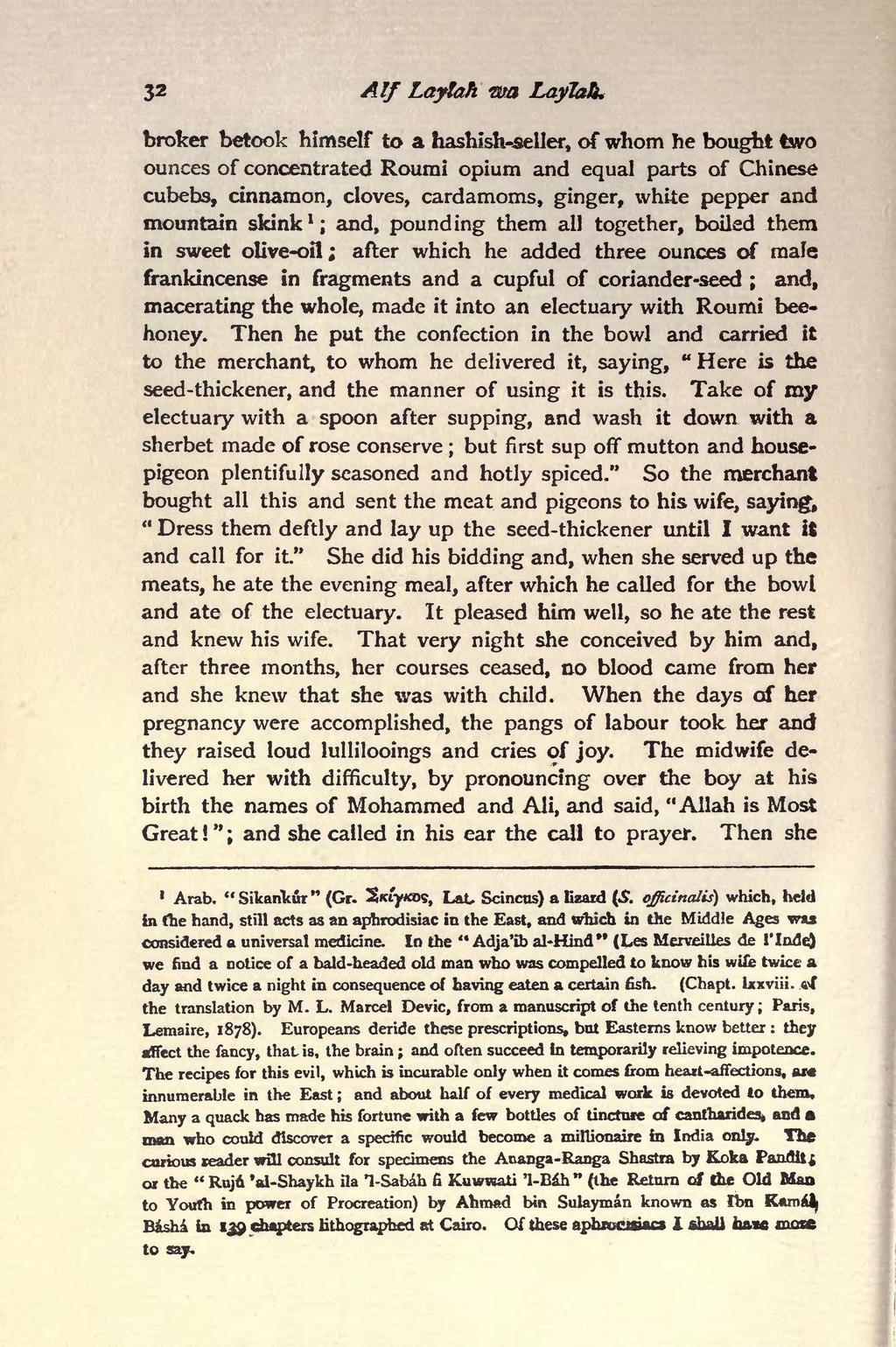broker betook himself to a hashish-seller, of whom he bought two ounces of concentrated Roumi opium and equal-parts of Chinese cubebs, cinnamon, cloves, cardamoms, ginger, white pepper and mountain skink[1]; and, pounding them all together, boiled them in sweet olive-oil; after which he added three ounces of male frankincense in fragments and a cupful of coriander-seed; and, macerating the whole, made it into an electuary with Roumi bee-honey. Then he put the confection in the bowl and carried it to the merchant, to whom he delivered it, saying, "Here is the seed-thickener, and the manner of using it is this. Take of my electuary with a spoon after supping, and wash it down with a sherbet made of rose conserve; but first sup off mutton and house pigeon plentifully seasoned and hotly spiced." So the merchant bought all this and sent the meat and pigeons to his wife, saying, "Dress them deftly and lay up the seed-thickener until I want it and call for it." She did his bidding and, when she served up the meats, he ate the evening meal, after which he called for the bowl and ate of the electuary. It pleased him well, so he ate the rest and knew his wife. That very night she conceived by him and, after three months, her courses ceased, no blood came from her and she knew that she was with child. When the days of her pregnancy were accomplished, the pangs of labour took her and they raised loud lullilooings and cries of joy. The midwife delivered her with difficulty, by pronouncing over the boy at his birth the names of Mohammed and Ali, and said, "Allah is Most Great!"; and she called in his ear the call to prayer. Then she wrapped
- ↑ Arab. "Sikankúr" (Gr. Σκίγκοσ, Lat. Scincus) a lizard (S. officinalis) which, held in the hand, still acts as an aphrodisiac in the East, and which in the Middle Ages was considered a universal-medicine. In the "Adja'ib al-Hind" (Les Merveilles de l'Inde) we find a notice of a bald-headed old man who was compelled to know his wife twice a day and twice a night in consequence of having eaten a certain fish. (Chaps. lxxviii. of the translation by M. L. Marcel Devic, from a manuscript of the tenth century, Paris Lemaire, 1878.) Europeans deride these prescriptions, but Easterns know better: they affect the fancy, that is the brain, and often succeed in temporarily relieving impotence. The recipes for this evil, which is incurable only when it comes from heart-affections, are innumerable in the East; and about half of every medical work is devoted to them. Many a quack has made his fortune with a few bottles of tincture of cantharides, and a man who could discover a specific would become a millionaire in India only. The curious reader will consult for specimens the Ananga-Ranga Shastra by Koka Pandit; or the "Rujú 'al-Shaykh ila 'l-Sabáh fi Kuwwati 'l-Báh" (the Return of the Old Man to Youth in power of Procreation) by Ahmad bin Sulaymán known as Ibn Kamál-Báshá, in 139 chapters lithographed at Cairo. Of these aphrodisiacs I shall have more to say.
